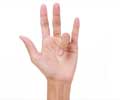Achilles tendon injuries is notorious among athletes and trainers as career killers and are among the most devastating.

Heinemeier and colleagues made this discovery by taking advantage of carbon-14 spikes resulting from post WWII nuclear bomb tests. Because of these tests, there was there was a large release of the radioactive carbon-14 (radiocarbon) to the atmosphere between 1955 and 1963. This sudden rise in carbon-14 – called the "bomb pulse" – reached a maximum of twice the natural atmospheric level in 1963, and then gradually dropped to the lower levels over time. This variation is reflected in all human tissue, because humans eat plants (and animals fed on plants) that take up carbon-14 from the atmosphere. Researchers studied the Achilles tendons from people who had lived during the carbon-14 bomb pulse peak, and found that the high carbon-14 levels of this period had remained in the tendon tissue for decades after. This persistence of radiocarbon can only be explained by the fact that the rate of tissue renewal is extremely slow in the tendon, if it exists at all. In fact, the results showed that the Achilles tendon stays the same after growing ends. In comparison, muscle tissue from the same persons had been constantly renewed and contained no "memory" of the radiocarbon.
"While the nation waits to see if another Olympic skier or NFL rookie recovers from serious tendon or ligament damage, this report serves as a cautionary tale to temper expectations," said Gerald Weissmann, M.D., Editor-in-Chief of The FASEB Journal. "When it comes to our tendons, what we have may be all we have. Like our teeth, it's far better and less painful in the long term to protect them throughout your lifetime than it is to count on a successful recovery."
Source-Eurekalert
 MEDINDIA
MEDINDIA




 Email
Email










